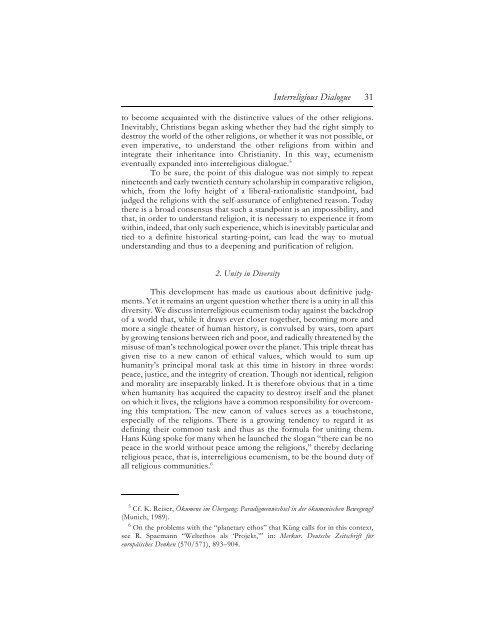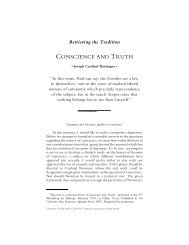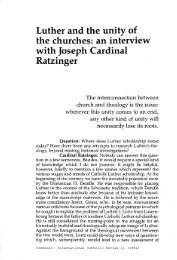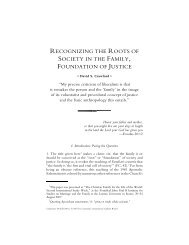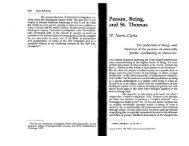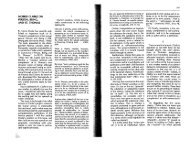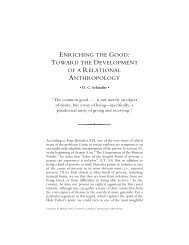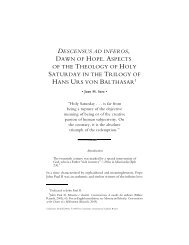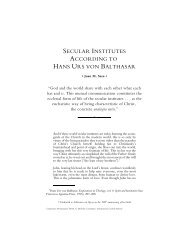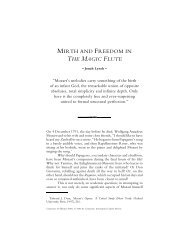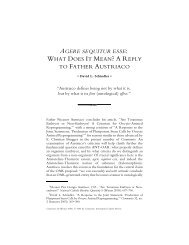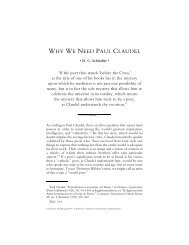Interreligious Dialogue and Jewish-Christian Relations - Communio
Interreligious Dialogue and Jewish-Christian Relations - Communio
Interreligious Dialogue and Jewish-Christian Relations - Communio
You also want an ePaper? Increase the reach of your titles
YUMPU automatically turns print PDFs into web optimized ePapers that Google loves.
<strong>Interreligious</strong> <strong>Dialogue</strong> 31<br />
to become acquainted with the distinctive values of the other religions.<br />
Inevitably, <strong>Christian</strong>s began asking whether they had the right simply to<br />
destroy the world of the other religions, or whether it was not possible, or<br />
even imperative, to underst<strong>and</strong> the other religions from within <strong>and</strong><br />
integrate their inheritance into <strong>Christian</strong>ity. In this way, ecumenism<br />
eventually exp<strong>and</strong>ed into interreligious dialogue. 5<br />
To be sure, the point of this dialogue was not simply to repeat<br />
nineteenth <strong>and</strong> early twentieth century scholarship in comparative religion,<br />
which, from the lofty height of a liberal-rationalistic st<strong>and</strong>point, had<br />
judged the religions with the self-assurance of enlightened reason. Today<br />
there is a broad consensus that such a st<strong>and</strong>point is an impossibility, <strong>and</strong><br />
that, in order to underst<strong>and</strong> religion, it is necessary to experience it from<br />
within, indeed, that only such experience, which is inevitably particular <strong>and</strong><br />
tied to a definite historical starting-point, can lead the way to mutual<br />
underst<strong>and</strong>ing <strong>and</strong> thus to a deepening <strong>and</strong> purification of religion.<br />
2. Unity in Diversity<br />
This development has made us cautious about definitive judgments.<br />
Yet it remains an urgent question whether there is a unity in all this<br />
diversity. We discuss interreligious ecumenism today against the backdrop<br />
of a world that, while it draws ever closer together, becoming more <strong>and</strong><br />
more a single theater of human history, is convulsed by wars, torn apart<br />
by growing tensions between rich <strong>and</strong> poor, <strong>and</strong> radically threatened by the<br />
misuse of man’s technological power over the planet. This triple threat has<br />
given rise to a new canon of ethical values, which would to sum up<br />
humanity’s principal moral task at this time in history in three words:<br />
peace, justice, <strong>and</strong> the integrity of creation. Though not identical, religion<br />
<strong>and</strong> morality are inseparably linked. It is therefore obvious that in a time<br />
when humanity has acquired the capacity to destroy itself <strong>and</strong> the planet<br />
on which it lives, the religions have a common responsibility for overcoming<br />
this temptation. The new canon of values serves as a touchstone,<br />
especially of the religions. There is a growing tendency to regard it as<br />
defining their common task <strong>and</strong> thus as the formula for uniting them.<br />
Hans Küng spoke for many when he launched the slogan “there can be no<br />
peace in the world without peace among the religions,” thereby declaring<br />
religious peace, that is, interreligious ecumenism, to be the bound duty of<br />
all religious communities. 6<br />
5 Cf. K. Reiser, Ökumene im Übergang: Paradigmenwechsel in der ökumenischen Bewegung<br />
(Munich, 1989).<br />
6 On the problems with the “planetary ethos” that Küng calls for in this context,<br />
see R. Spaemann “Weltethos als ‘Projekt,’” in: Merkur. Deutsche Zeitschrift für<br />
europäisches Denken (570/571), 893–904.


